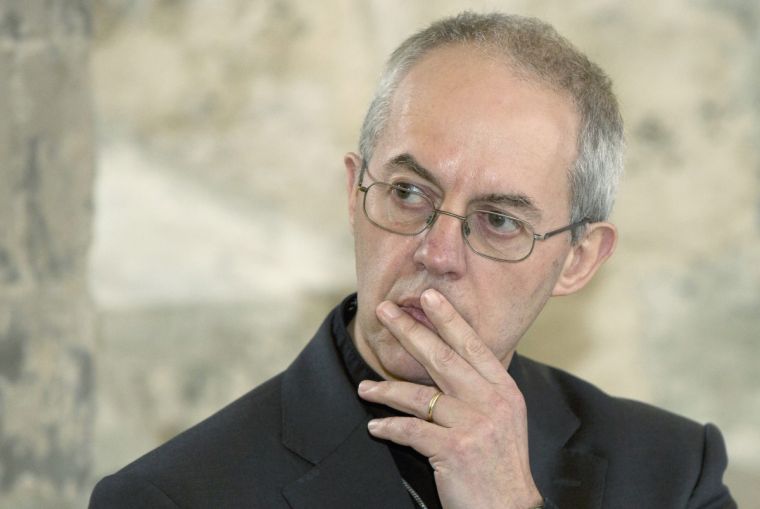Justin Welby: Legalising assisted dying would dehumanise society forever

Legalising "assisted dying" would dehumanise society forever, the Archbishop of Canterbury has warned.
Writing in The Observer, the Most Rev Justin Welby said the nation will cross a "legal and ethical Rubicon" if parliament allows terminally ill patients to end their lives. He was backed by faith leaders who joined forces with him to write to every MP urging them to vote against the assisted dying bill when it is debated in the Commons on Friday.
The Labour MP Rob Marris' private member's bill would, if passed, legislate for the terminally ill to be prescribed drugs to end their lives as long as doctors agreed they had up to six months left to live and were of a "clear and settled intention" to die.
The patient would only get the go ahead after two doctors and a family court judge had examined the diagnosis and made sure they were mentally competent to decide to die and were doing so without being coerced.
Marris' bill is similar to that of Lord Falconer which ran out of parliamentary time last year after getting through the early stages.
Assisting a suicide is currently an offence under the Suicide Act 1961, punishable with up to 14 years' imprisonment.
Lord Falconer told the Observer: "No one disputes the law is a mess – the former DPP who tried to make it work, the police, the courts right up to the supreme court, and above all people who are dying and those who love them. Legislators and the government need to address the mess and find a solution. It is so clearly time for the government to step in and set up a trusted process which will seek a solution in which the public will have confidence."
Marris said: "With strong safeguards, terminally ill adults of sound mind should be allowed a legal choice to have assistance to end their own lives. Those who believe that ending one's own life is always wrong should not deny choice to those of us who do not share their beliefs.
"The current law is a mess, with home suicides, technically illegal actions by some doctors, and Dignitas deaths. DPPs have had to issue guidelines on when it is not in the public interest to prosecute – but in a democracy it is elected representatives who should make the law."
Sarah Wootton, chief executive of Dignity in Dying, said: "The question is no longer whether the law is broken, as has recently been confirmed by the former director of public prosecutions, but rather whether MPs will fix it."
Archbishop Welby said he and the faith leaders were not intending to impose a "religious viewpoint" on others, but they were concerned that a change in the current law would have "detrimental effects" on individuals and society.
He concedes that one of his predecessors, Lord Carey of Clifton, is among those who have called for a change in the law. The faith leaders opposed his view, and were speaking from philosophical and theological reflections as well as from a vast range of pastoral experience.
Archbishop Welby said he was concerned that a change would cross a "fundamental legal and ethical Rubicon" by abandoning a respect for life.
While not a crime in the UK to commit suicide, it is discouraged. "The assisted dying bill requires us to turn this stance on its head, not merely legitimising suicide, but actively supporting it. We are asked to sanction doctors participating in individuals taking steps to end their lives. This is a change of monumental proportions both in the law and in the role of doctors; it is little wonder that it is opposed by the medical profession."
He said he knows what it is like to sit at a loved one's bedside and be torn by fears and worries about their future.
But a change in the law would mean the legal understanding of the "right to life" would have to be fundamentally rewritten and for no good effect, he argued.
He also said it would put vulnerable people at risk. Age UK estimates that as many as 500,000 elderly people are abused in the UK each year.
"We know from the US states of Oregon and Washington that between 40 per cent and 60 per cent of those who used legally prescribed lethal drugs to end their lives cited concern that they would be a burden on their families as a factor in their decision to bring their lives to a premature end."
Once a law was in place there could be no effective safeguard against this, he warned.
"The exhaustion of caring, sometimes combined with relationships that have been difficult for years before someone fell ill, can lead people to want and feel things that they should not."
However, not all faith leaders agreed.
Dr Jonathan Romain, Rabbi of Maidenhead Synagogue and chairman of Inter-Faith leaders for Dignity in Dying, said: "We hold that life is precious and to be valued, but when it becomes unbearable, there is no reason for someone already dying who wishes to relinquish it to be forced to carry on against their will. Assisted dying for the terminally ill who are mentally competent and request it of their own free is not a mortal sin but a religious option. If the forthcoming Marris Bill is passed by Parliament, trips to Dignitas will no longer be necessary, nor secretive DIY attempts at home, and those like the recent traveller to Dignitas, Bob Cole, will be able to die in peace in familiar surroundings."
Groups such as Action on Elder Abuse, Mencap and Scope wrote to peers last year opposing the change.











